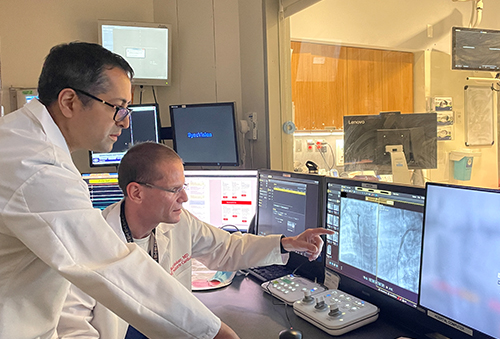Each year in the United States, approximately 40,000 infants are born with a congenital heart disease (CHD), and approximately 2 to 3 million individuals1 are living with CHD. The number of adult patients now exceeds the number of pediatric patients..
At Weill Cornell Medicine and NewYork-Presbyterian, two interventional cardiologists combine a unique set of skills to provide the best possible care for patients with congenital heart disease. These skills include percutaneous coronary intervention, interventional treatment of structural heart disease, pediatric cardiac interventions, as well as interventional therapies for patients with congenital heart disease. While the latter is the unifying element applicable to both interventional cardiologists, it is the combination of the expertise in all four categories of interventional therapy in the same procedure that makes this a truly unique collaboration.
Ralf Holzer, MD, is Chief of the Division of Pediatric Cardiology at NewYork-Presbyterian Komansky Children's Hospital, as well as Director of Pediatric Cardiac Catheterization at NewYork-Presbyterian/Weill Cornell Medical Center. An internationally renowned expert in pediatric and adult congenital transcatheter interventions with more than 20 years experience, Dr. Holzer has performed close to 4,000 cardiac catheterization procedures of which 80 percent were in pediatric patients (the smallest with a weight of less than 2 pounds), and 20 percent in adult patients with congenital heart disease (the oldest being close to 70 years of age). He is also the David Wallace-Starr Foundation Professor of Pediatric Cardiology at Weill Cornell Medicine.
Harsimran Singh, MD, is a highly trained specialist in adult congenital heart disease and adult interventional cardiology, including structural heart disease and percutaneous coronary interventions. In addition to being a specialist in adult interventional cardiology, Dr. Singh is one of few physicians nationwide who has undergone formal specialized training focused on cardiac catheter interventional procedures in adult patients with congenital heart disease. Dr. Singh is Director of the Adult Congenital Heart Disease program and the Adult Cardiovascular Disease Fellowship program at NewYork-Presbyterian/Weill Cornell.

Dr. Harsimran Singh and Dr. Ralf Holzer
Dr. Holzer and Dr. Singh are acutely aware that adult patients with congenital heart disease make up a very varied, extremely complex, and rapidly growing population. But fewer than 10 percent1 of adults with CHD are receiving the highly specialized expertise needed to manage the range of cardiac care they will likely require over their lifetime. Five years ago, Dr. Holzer and Dr. Singh began an extraordinary collaboration, bringing together their particular areas of expertise to optimize the outcomes of patients of all ages. Since that time, together they have performed all transcatheter procedures for pediatric and adult congenital patients with CHD, incorporating the latest devices and techniques.
“In the last year, two newly FDA approved pulmonic valves became available for transcatheter replacement – the Medtronic Harmony™ transcatheter pulmonary valve and the Edwards SAPIEN 3 transcatheter valve with the Alterra adaptive prestent,” says Dr. Singh. “Pulmonary valve disease is predominantly a congenital heart problem, particularly affecting patients with tetralogy of Fallot, but other anatomies as well. Until this past year, there were no options for transcatheter valve solutions for a large segment of these patients because of their anatomic size and complexity. These latest valve technologies allow us to treat patients with congenital heart disease who have an enlarged pulmonary valve annulus in a way that wasn’t possible a year ago.”
Dr. Holzer and Dr. Singh recently incorporated the transcatheter Harmony valve into their range of treatment options. “The procedure itself is technically easier and takes less time than with other valves and is a great addition for our pediatric and adult congenital patients,” says Dr. Holzer. “The very large number of cases we have performed together demonstrates the power of cooperation, and we are doing them as a team for the sake of optimizing care at NewYork-Presbyterian.”
Essentially, what Dr. Holzer and Dr. Singh are accomplishing with their partnership is a triumph of expertise in four areas for patients with a wide spectrum of congenital heart problems. Dr. Holzer’s expertise covers the full range of transcatheter interventions, including device closure of ventricular septal defects, pulmonary artery stenting, and transcatheter pulmonary valve implantation, including complex reconstructions of the pulmonary outflow tract. Dr. Singh provides both medical and interventional therapeutics that include valve replacements, closure of defects, complex stenting, and percutaneous coronary interventions in adult cardiac patients with and without CHD. He also performs structural interventions for adults with uncorrected congenital heart defects, including PFO and atrial septal defects.
Essentially, what Dr. Holzer and Dr. Singh are accomplishing with their partnership is a triumph of expertise in four areas – pediatric and adult transcatheter interventions for patients with congenital heart problems, further supported by a skillset in catheter-based methods to treat adult heart disease.
“In Dr. Singh, we have an adult interventional cardiologist who is not only specifically trained in congenital heart disease, but also in catheter-based methods to treat adult coronary artery, peripheral vascular, valvular, and structural heart disease,” notes Dr. Holzer. “Having this combination of skills at the table during an interventional procedure for CHD is hugely important, particularly when you come across the unexpected, such as difficult coronary artery anatomy or when working on a patient who is on a mechanical circulatory support device.”
“It is unique to have a pediatric interventionalist and an adult interventionalist – both with specialized training and experience in CHD – consistently caring for all of the major complex valvular or complex congenital heart disease patients in collaboration,” adds Dr. Singh. “Our skills are complementary. We believe working together improves our ability in what we can offer patients and improves patient outcomes.”
Dr. Holzer concurs. “Over the past five years, we have clearly demonstrated that bringing our separate areas of expertise into each procedure emphasizes the unique strength we have here at NewYork-Presbyterian. We have the best of both worlds – pediatric and adult interventional expertise side-by-side. I think very few centers in the country have a setting where crossover with pediatric and adult interventional care for CHD is seamless.”



